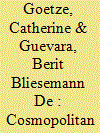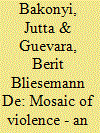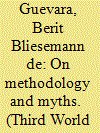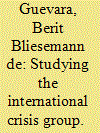|
|
|
Sort Order |
|
|
|
Items / Page
|
|
|
|
|
|
|
| Srl | Item |
| 1 |
ID:
141057


|
|
|
|
|
| Summary/Abstract |
Cosmopolitanism has been argued to be a crucial component of peacebuilding, both with regard to its aims as well as its staff. In a universalist-liberal understanding of the concept, cosmopolitanism is the optimal mind frame for peacebuilders to rebuild post-war societies, due to the tolerance, justice-orientation, and neutrality regarding local cleavages that the concept entails in theory. This article argues, however, that cosmopolitanism cannot be understood outside of its social context, therefore requiring sociological empirical analyses. Drawing on three such sociological concepts, namely elite, glocal, and localisable cosmopolitanism, the article analyses empirically through interviews with peacebuilders in Kosovo whether and in which form these international civil servants display cosmopolitan worldviews. The study concludes that while in theory the localisable variant would be best suited to contribute to locally sensitive, emancipatory peacebuilding, this form of cosmopolitanism is absent in practice. Given the novel, exploratory character of this analysis of hitherto uncharted terrain, the article also discusses in detail how the findings were obtained and in how far they are generalisable.
|
|
|
|
|
|
|
|
|
|
|
|
|
|
|
|
| 2 |
ID:
103216


|
|
|
|
|
| Publication |
2011.
|
| Summary/Abstract |
When political actors and international relations scholars invoke 'the international community', the term is commonly framed very loosely. It is used either as a reference to the norms of international politics or, according to its composition, as a coalition of concerned actors. This article, by contrast, argues that it is the interplay of image and practice of the term's invocation that shapes its multi-faceted character. 'The international community' can be used by many different groups, state and non-state alike, to locate their political goals in the context of a wider array of values. Usually, these norms are state related and can be used to simulate political relevance. Conversely, actors defying widely accepted values can be excluded and policy against them legitimized. Addressing domestic as well as international audiences, the claim to be acting as, or on behalf of, 'the international community' is mostly virtual but has definite political consequences.
|
|
|
|
|
|
|
|
|
|
|
|
|
|
|
|
| 3 |
ID:
103124


|
|
|
| 4 |
ID:
133258


|
|
|
|
|
| Publication |
2014.
|
| Summary/Abstract |
Exploring the historiography of the International Crisis Group (icg), this article looks critically at the narratives surrounding the organisation's self-declared success. The focus is specifically on the so-called icg methodology, consisting of field-based research and analysis, practical policy recommendations and high-level advocacy. Combining a three-level approach to the analysis of organisational cultures with Yanow's concept of organisational myths, the article argues that the icg methodology contains a number of organisational myths that are meant to mask tensions and contradictions in the organisation's underpinning basic assumptions and values, which, if publicly discussed, could have the power to undermine its expert authority. The four myths looked at in detail are the 'field facts myth', the 'myth of flexible pragmatism', the 'myth of uniqueness' and the 'neutrality/independence myth'.
|
|
|
|
|
|
|
|
|
|
|
|
|
|
|
|
| 5 |
ID:
133254


|
|
|
|
|
| Publication |
2014.
|
| Summary/Abstract |
This special issue studies the International Crisis Group (icg), one of the most notable and widely referenced producers of knowledge about conflict areas, used extensively by policy makers, the media and academics. The authors take different theoretical and methodological approaches to make sense of this hard-to-ignore conflict expert, exploring the icg's daily operations and role in international politics. This introduction sets the scene by offering a critical exploration of the organisation and its approach to the construction of political knowledge. It analyses the icg's position in the conflict-related knowledge market and the sources of its expert authority. It then discusses the organisation's roles - from mediation to instrumentalisation - in the 'battlefield of ideas' in conflict and intervention contexts and its potential to make an impact on policy framings and outcomes. It shows that studies of the icg need to 'unpack' the organisation in order to account for it as both a highly successful international expert brand and a very heterogeneous actor in specific contexts and at specific times.
|
|
|
|
|
|
|
|
|
|
|
|
|
|
|
|
|
|
|
|
|